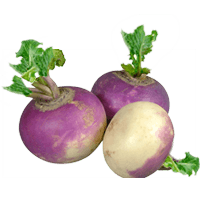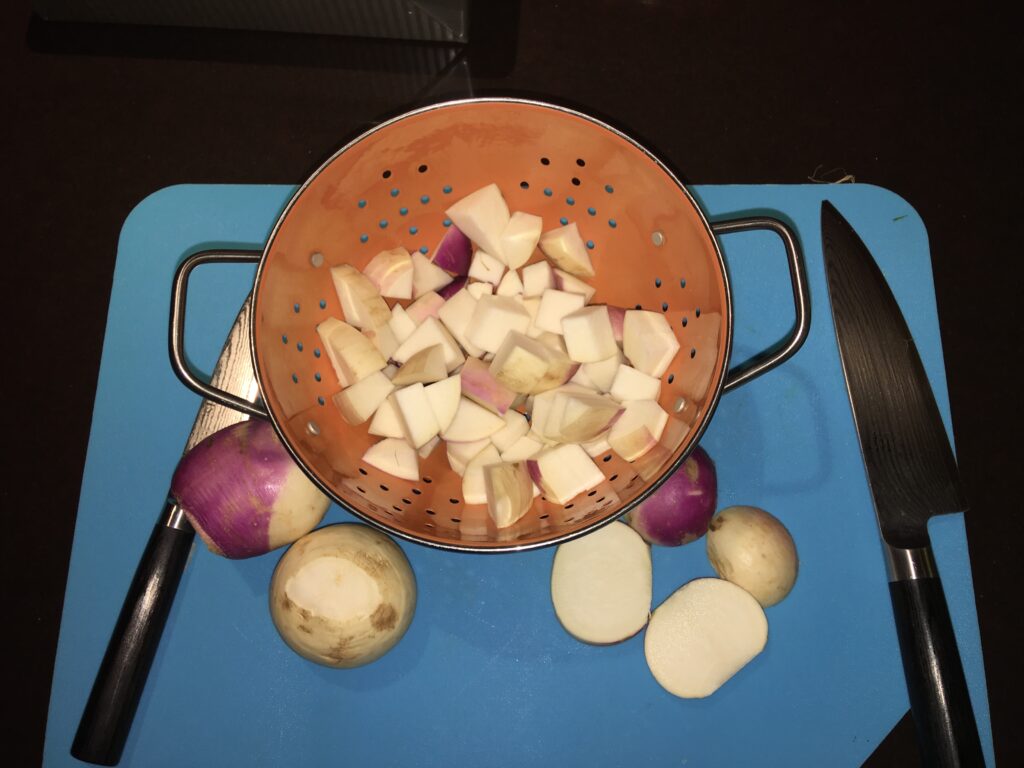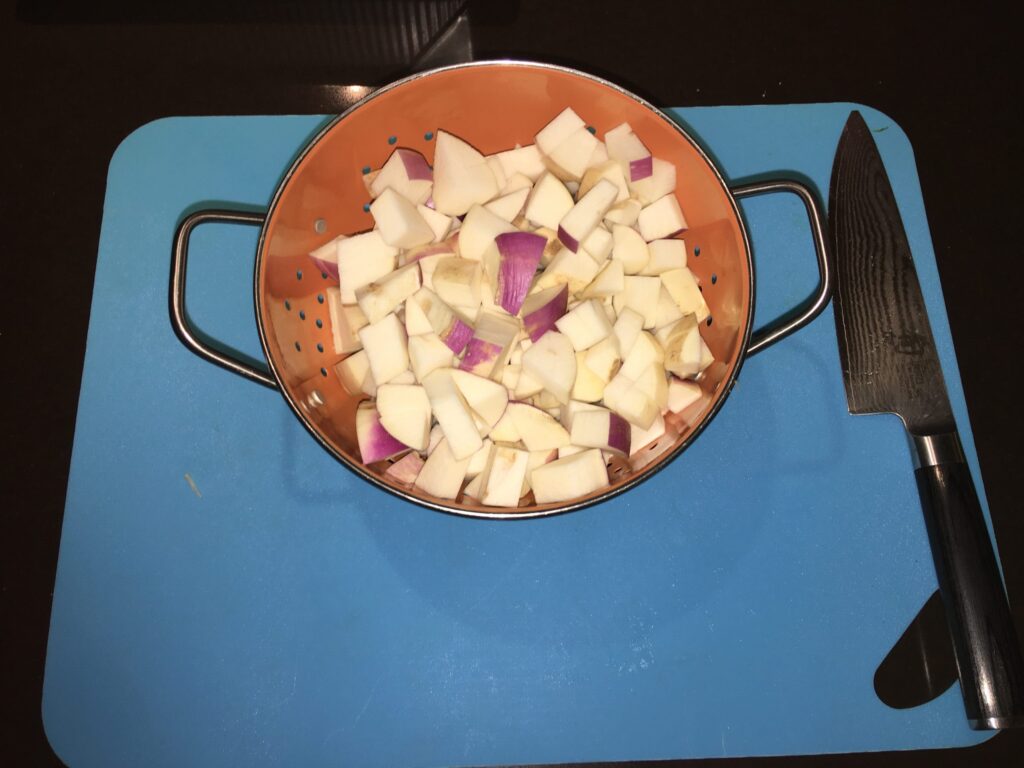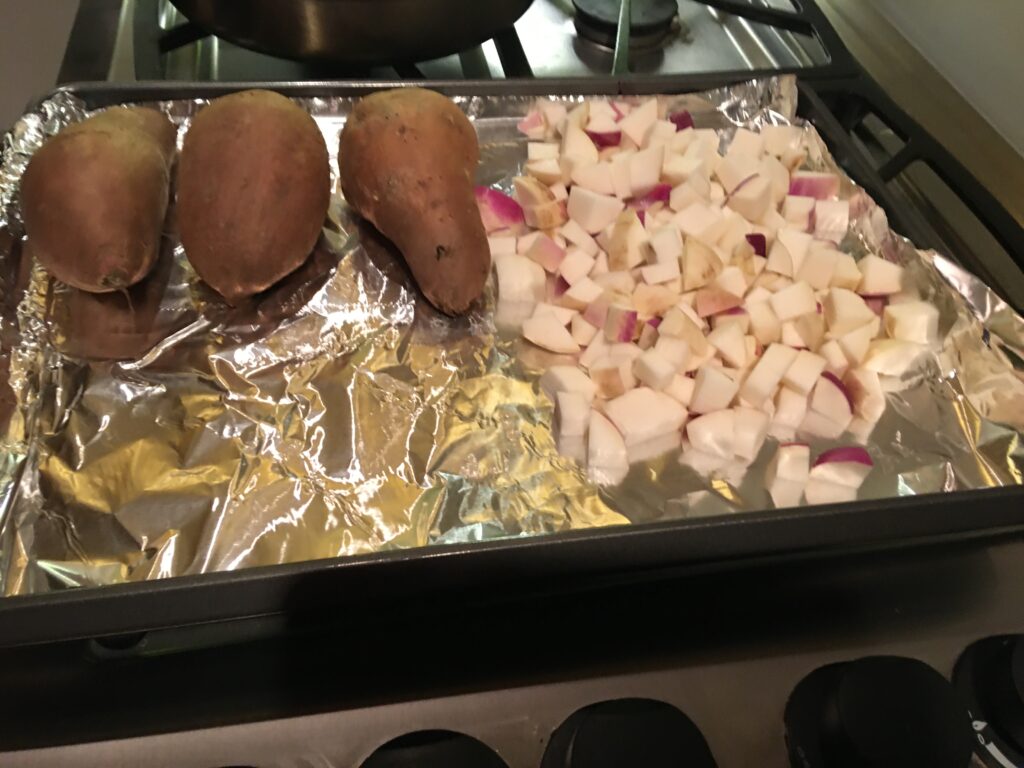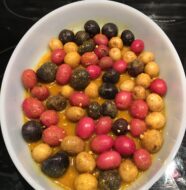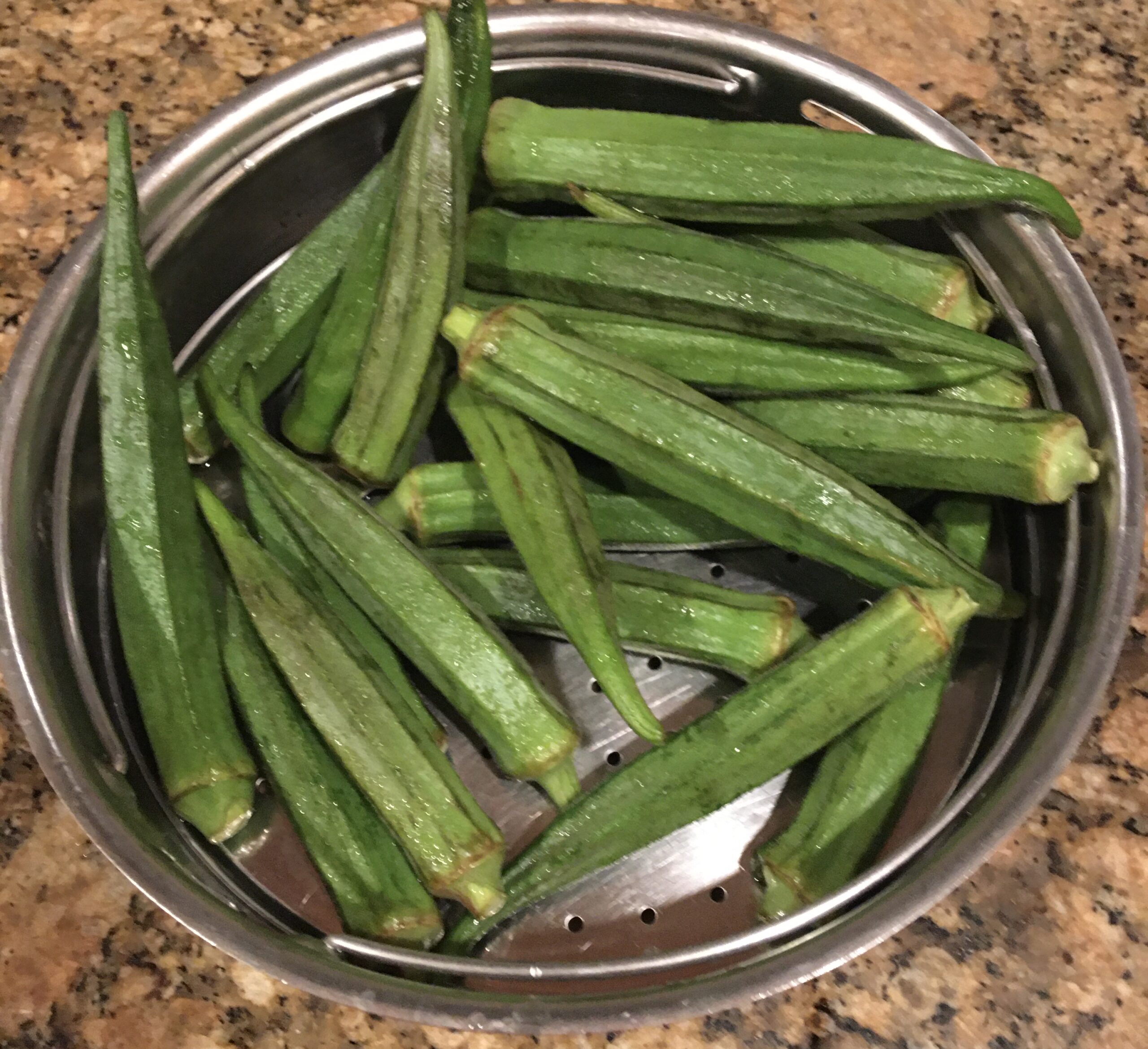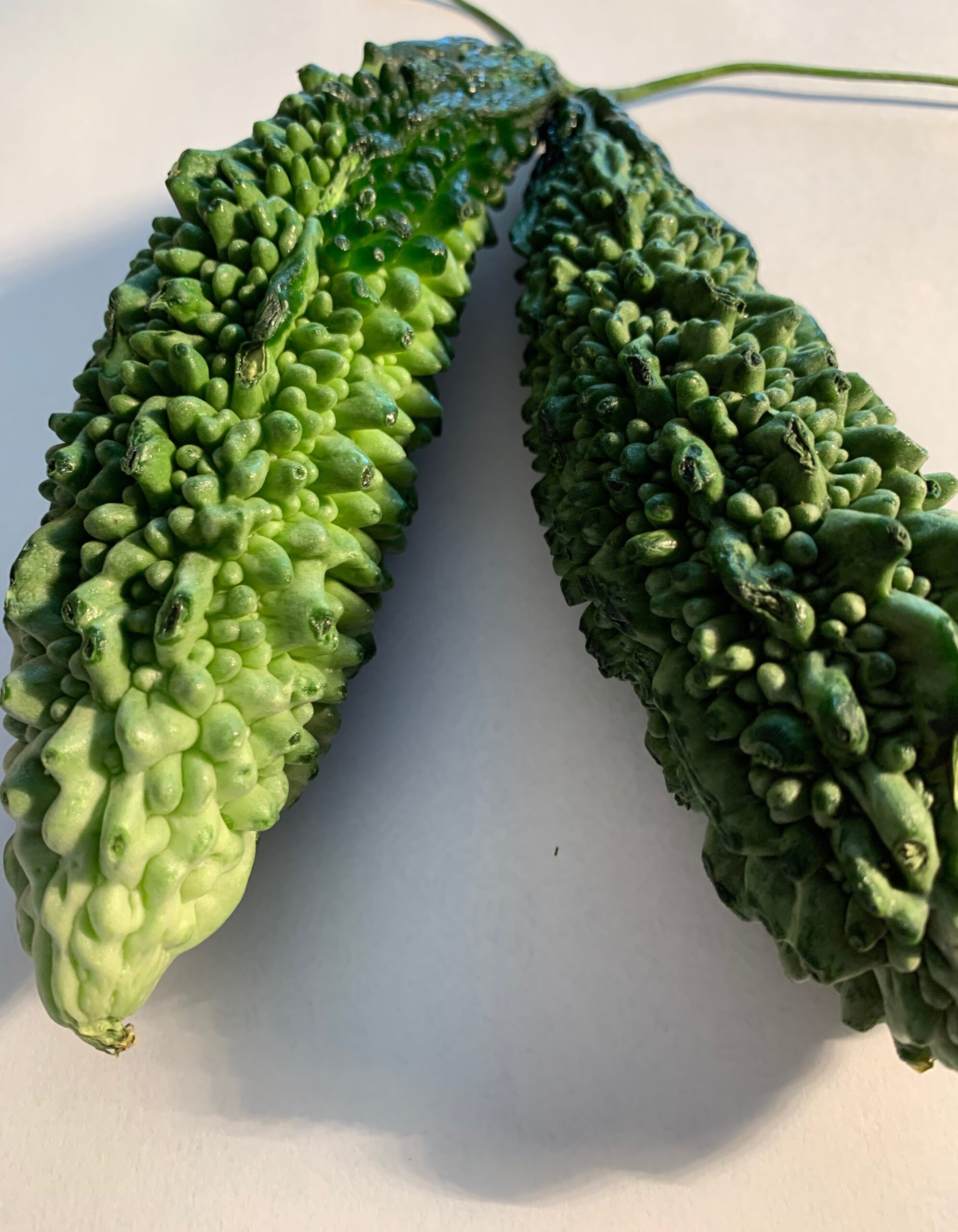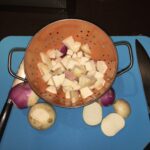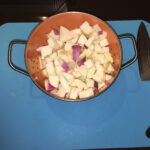Turnips, scientific name “Brassica Rapa “, belong to the cruciferous family of vegetables and are cousins of Broccoli, Brussels Sprouts, Arugula & Kale. They are low calorie, circular with tuberous roots that are grown in temperate areas – Europe and Asia as cool-season vegetables. They are iron and calcium-rich but their fresh green tops are more nutritious having more vitamins, minerals & antioxidants. They are excellent at soaking up the flavor as well as adding a hearty element to soups and stews. Baby turnips can be eaten raw in salads. Turnips greens are a storehouse of A
This Subzee is made with a spice paste made of sesame & poppy seeds, cloves, peppercorns & cinnamon. Cooked turnip cubes are simmered in the onion tomato gravy.
Buying & Storage: Fresh turnips are available year-round. Fresher turnips flood the market from October through March. When buying turnips choose those that are small with a mild sweet flavor. Completely grown turnips are 3″ in diameter and weight 60-250g. Fresh tubers are sold in bunches with top greens. Avoid larger as well as very mature turnips since they are woody in texture and unappetizing. Separate the tops from the greens as they rob the nutrients off the roots. Turnips can be stored in the refrigerator for a few weeks at 32-35F and high humidity 95%.
History: Turnips have been known as an important part of the human diet for over 2000 years. Countries from Brazil to England, Japan to Iran, the United States, and Norway have all their culinary takes on turnips and have made them a staple in their own cultural meals for centuries. They have been cultivated by ancient Greeks and Romans but introduced by the British during their colonial years in India.
Nutrition facts of Turnip (Brassica Rapa)100g raw- % DV
| GI 73 GL1 Water 95.6g | Minerals | Vitamins |
| Carb 6.4 g (2%) | Calcium 30mg 3% | Vitamin C 21mg (35 %) |
| Protein 0.9 g(2%) | Iron 0.3mg (2%) | Vitamin K 0.1mcg (0 %) |
| Fat 0.8 g (0%) | Magnesium 11mg(2%) | Niacin:0.4mg (2 %) |
| Sugar 3.8g | Phosphorous 27mg (3%) | Vitamin B6 (0.1mg) 4 % |
| Water 91.9 g | Potassium191mg (5%) | Folate 15mcg (4 %) |
| Calories 28 | Sodium 67mg (3%) | Pantothenicacid 0.2mg(2%) |
| Copper 0.1mg (4%) | Choline:11.1 mg (2%) | |
| Selenium 0.7mcg (1%) | ||
| Manganes 0.1mg (7%) | ||
| Zinc 0.3mg (2%) |
Health benefits of Turnips
- Anticancer potential: A very good source of antioxidants to help the body scavenge harmful free radicals, help boost immunity & for cancer prevention. Cruciferous vegetables like turnip help in lowering the risk of breast, prostate, lungs & possess the ability to reduce cancer risk.
- Boost immune system: rich in vitamin C and Ascorbic acid; 100g provides 35% of RDA; required for the synthesis of collagen and immunity booster. Vitamin C can stimulate the production of white blood cells and antibodies besides functioning as an antioxidant and reducing chronic diseases like cancer and heart diseases.
- Fight inflammation: turnip greens are packed with omega 3 fatty acids and vitamin K which are good fats that can lower inflammation, balance cholesterol levels & promote overall wellness. Boiling and consuming turnip greens is very effective for those who suffer from arthritis, gout, or chronic pain.
- Improve bone strength: calcium in turnips can aid in the growth and repair of bone matter throughout the body.; calcium is essential for boosting bone mineral density and prevent arthritis and osteoporosis.
- Increase blood circulation with high iron content needed for Red Blood Cell formation; also needed by the body to oxygenate, repair & run the body’s organ systems.
- Optimize digestion: dietary fiber can bulk up the stool and move it through the gut while promoting better absorption of nutrients. Thus it helps treat symptoms of constipation, diarrhea, cramping, bloating & gastric issues.
- Promote heart health: turnips have high levels of potassium and fiber. Potassium functions as a vasodilator.
reducing the strain on blood vessels and arteries thus lowering blood pressure. This can prevent the development ofAtherosclerosis , heart attacks & stroke. Fiber scrapes excess cholesterol from the heart eliminating it from the body. - Regulate metabolism and help with weight loss: Turnips have a healthy dose of B vitamins, ensuring that all our organ systems are functioning properly and hormone levels are stable thus helping with weight loss.
Spice Power
- Turmeric powder: Curcumin in turmeric powder may improve Endolitheal function the thin membrane that covers the inside of the heart and blood vessels which plays a key role in controlling blood pressure. It may also protect against age-related loss of function and reduce the risk of heart disease.
- Sesame seeds: anti-cancer properties – rich in oil-soluble lignans like sesamin and sesamolin. A research study published in the journal Nutrition and Cancer found that dietary lignans play a key role in cancer prevention. They have a high level of vitamin E, K & Magnesium which have an anti-carcinogenic effect on the body. They also contain phytate – a rare, cancer-preventing compound that functions as an antioxidant and reduces the effects of free radicals. Sesame seeds have been linked to a reduced risk of leukemia, breast, lung, pancreatic, colon & Prostate cancers.
- Poppy seeds: alleviate stress, promote good sleep, treat mouth &.enhance psychological health.
- Cinnamon: can improve sensitivity to the hormone insulin, lowers blood sugar levels & has a powerful anti-diabetic effect.
- Cloves: high in antioxidants eugenol and vitamin C both of which help reduce oxidative stress. they also promote oral health by killing bacteria due to their anti-microbial properties.
- Peppercorn: piperine in it is a potent antioxidant that can help prevent free radical damage to cells. It may also promote gut health, give pain relief & reduce appetite.
- Cilantro leaves: a natural preservative due to the high antioxidant content. with a compound ” Dodecanal “.
- Parsley Leaves: rich in vitamin K necessary for optimal bone health with a reduced risk of bone fractures and improved bone mineral density.
- Oregano leaves: Carvacrol and Thymol are two compounds present in oregano that have been shown to decrease the activity of viruses.
Method to make Turnip Rassa
- Peel the skin off turnips and cut them into 1″ cubes. Rinse in water and drain. (5 min.)
- Bake the cubed turnips and whole sweet potatoes (45 min.) OR
- Cook with salt and turmeric powder in a pan on the stove or microwave. (10 min.)
- While the turnips are cooking, peel and chop onions, ginger, and garlic.(2 min.)
- Place tomatoes in boiling water; peel skin and puree; keep aside. (3 min.)
- Dry roast the spices and grind to a powder. (2 min.)
- Heat oil in a frying pan; add onions, garlic and ginger; sauté until translucent. (2 min.)
- Add spice powder, tomato puree, and baked or cooked turnip cubes.
- Simmer on low heat until the gravy thickens. (5 min.)
- Garnish with chopped cilantro/parsley/oregano/ thyme leaves.
Serve Turnip in gravy (Shaljam Rassa) with Quinoa, Brown rice, Naan, Pasta or Bread rolls.
TIPS
Sweet gravy: use sweet potatoes and mash into the gravy
Spicier gravy. Two red chilies or 1 tsp chili powder can be ground in the paste
Variation: Bottle gourd can be cooked in a similar manner
Shaljam= turnip; Rassa = gravy

